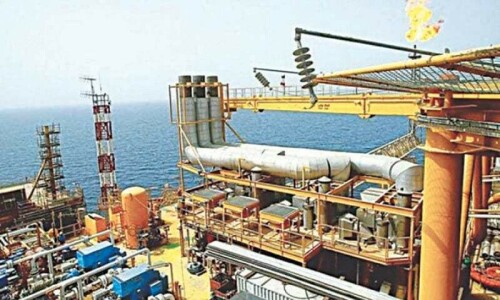Trade deficit falls sharply by 38pc in July-August

ISLAMABAD: The country’s trade deficit shrank by nearly 38 per cent in the first two months of current fiscal year, driven largely by a decline in imports of non-essential luxury items.
The constant decline in trade deficit shows the government’s battle against bloated trade deficit is finally bearing fruit as imports have plummeted despite paltry growth in exports proceeds.

Provisional trade figures available with Dawn showed the trade deficit dipped to $3.973 billion in July-August from $6.37bn over the corresponding months last year, reflecting a decline of 37.62pc.
On a monthly basis, the trade deficit decelerated by a hefty margin of 42.25pc to $1.848bn in August as against $3.20bn over the corresponding month last year. The government has set a target to bring down annual trade gap to $27.476bn by June 2020.
During the last fiscal year, the country’s trade deficit narrowed to $31.82bn, registering a decline of 15.33pc. The decline came on the back of government’s interventions to arrest the rising import bill even though export proceeds posted a mixed trend during the same period.
Exports remain stagnant in first two months of 2019-20
The provisional figures show the imports in July and August clocked in at $7.659bn, down 21.74pc from $9.787bn over corresponding period last year.
The decline is significantly steeper as the value of imported goods in August dipped by 26.9pc to $3.64bn as against $4.98bn over the corresponding month last year.
Imports have remained well above the $3bn mark since October 2016 and have risen consistently over the period peaking at $5.8bn in May 2018. The incumbent government has taken several measures to curtail rising import bill since coming into power in August 2018.
Because of these policies, the value of dutiable imports dropped to $4.4bn in July-August as against $6.8bn over the corresponding months last year, showing a decline of 35.3pc. The decline in dutiable imports is mainly due to the imposition of regulatory duties on luxury items and automobiles.
Moreover, the government also slapped banned furnace oil imports last year, in addition to a number of policy interventions including improved energy supply, import substitution drive, economic stabilisation, and currency devaluation.
On the other hand, duty-free imports — machinery and raw materials — grew by 6.89pc to $3bn in July-August as against $2.9bn over the corresponding months last year. The growth comes on the back of government’s decision to exempt maximum raw materials from duty in the last budget and facilitate machinery-related imports to promote economic activities in the country.
According to a customs officer, the import bill could have declined further had the government not waived off duty on import of 1,639 raw materials in the last budget.
He claimed that the rise in raw material and machinery imports is likely to accelerate industrial growth in the country. “We are expecting that duty waiver on raw materials and machinery will boost economic activities in the current fiscal year”, the official hoped.
Further, the country’s merchandise exports grew by 8pc to $3.686bn in July and August, from $3.41bn during the same period last year. The numbers are massively discouraging, as exports, which should have grown over the last few months owing to multiple currency depreciations, have failed to pick up.
The growth in export proceeds during July was encouraging as it grew by 15.65pc on a year-on-year basis. However, exports during August grew by a scanty 1.12pc to $1.792bn as against $1.772bn over the corresponding month last year.
Cumulative exports during the ongoing fiscal year are likely to reach $26.187bn, up from $24.656bn in FY19. The government has already reduced the cost of raw materials and semi-finished products used in exportable products by exempting them from all customs duties.
Published in Dawn, September 13th, 2019












































